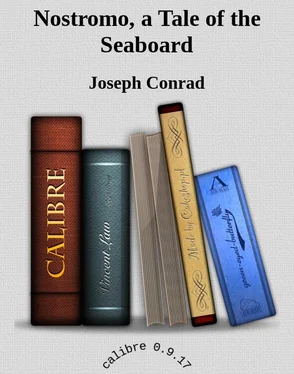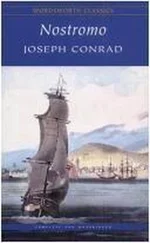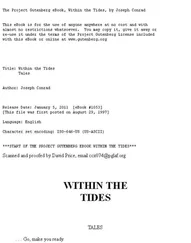Joseph Conrad - Nostromo, a Tale of the Seaboard
Здесь есть возможность читать онлайн «Joseph Conrad - Nostromo, a Tale of the Seaboard» весь текст электронной книги совершенно бесплатно (целиком полную версию без сокращений). В некоторых случаях можно слушать аудио, скачать через торрент в формате fb2 и присутствует краткое содержание. Жанр: Старинная литература, на английском языке. Описание произведения, (предисловие) а так же отзывы посетителей доступны на портале библиотеки ЛибКат.
- Название:Nostromo, a Tale of the Seaboard
- Автор:
- Жанр:
- Год:неизвестен
- ISBN:нет данных
- Рейтинг книги:4 / 5. Голосов: 1
-
Избранное:Добавить в избранное
- Отзывы:
-
Ваша оценка:
- 80
- 1
- 2
- 3
- 4
- 5
Nostromo, a Tale of the Seaboard: краткое содержание, описание и аннотация
Предлагаем к чтению аннотацию, описание, краткое содержание или предисловие (зависит от того, что написал сам автор книги «Nostromo, a Tale of the Seaboard»). Если вы не нашли необходимую информацию о книге — напишите в комментариях, мы постараемся отыскать её.
Nostromo, a Tale of the Seaboard — читать онлайн бесплатно полную книгу (весь текст) целиком
Ниже представлен текст книги, разбитый по страницам. Система сохранения места последней прочитанной страницы, позволяет с удобством читать онлайн бесплатно книгу «Nostromo, a Tale of the Seaboard», без необходимости каждый раз заново искать на чём Вы остановились. Поставьте закладку, и сможете в любой момент перейти на страницу, на которой закончили чтение.
Интервал:
Закладка:
This memory did not make him shudder, but it had made of him what he was in the eyes of respectable people, a man careless of common decencies, something between a clever vagabond and a disreputable doctor. But not all respectable people would have had the necessary delicacy of sentiment to understand with what trouble of mind and accuracy of vision Dr. Monygham, medical officer of the San Tome mine, remembered Father Beron, army chaplain, and once a secretary of a military commission. After all these years Dr. Monygham, in his rooms at the end of the hospital building in the San Tome gorge, remembered Father Beron as distinctly as ever. He remembered that priest at night, sometimes, in his sleep. On such nights the doctor waited for daylight with a candle lighted, and walking the whole length of his rooms to and fro, staring down at his bare feet, his arms hugging his sides tightly. He would dream of Father Beron sitting at the end of a long black table, behind which, in a row, appeared the heads, shoulders, and epaulettes of the military members, nibbling the feather of a quill pen, and listening with weary and impatient scorn to the protestations of some prisoner calling heaven to witness of his innocence, till he burst out, "What's the use of wasting time over that miserable nonsense! Let me take him outside for a while." And Father Beron would go outside after the clanking prisoner, led away between two soldiers. Such interludes happened on many days, many times, with many prisoners. When the prisoner returned he was ready to make a full confession, Father Beron would declare, leaning forward with that dull, surfeited look which can be seen in the eyes of gluttonous persons after a heavy meal.
The priest's inquisitorial instincts suffered but little from the want of classical apparatus of the Inquisition At no time of the world's history have men been at a loss how to inflict mental and bodily anguish upon their fellow-creatures. This aptitude came to them in the growing complexity of their passions and the early refinement of their ingenuity. But it may safely be said that primeval man did not go to the trouble of inventing tortures. He was indolent and pure of heart. He brained his neighbour ferociously with a stone axe from necessity and without malice. The stupidest mind may invent a rankling phrase or brand the innocent with a cruel aspersion. A piece of string and a ramrod; a few muskets in combination with a length of hide rope; or even a simple mallet of heavy, hard wood applied with a swing to human fingers or to the joints of a human body is enough for the infliction of the most exquisite torture. The doctor had been a very stubborn prisoner, and, as a natural consequence of that "bad disposition" (so Father Beron called it), his subjugation had been very crushing and very complete. That is why the limp in his walk, the twist of his shoulders, the scars on his cheeks were so pronounced. His confessions, when they came at last, were very complete, too. Sometimes on the nights when he walked the floor, he wondered, grinding his teeth with shame and rage, at the fertility of his imagination when stimulated by a sort of pain which makes truth, honour, selfrespect, and life itself matters of little moment.
And he could not forget Father Beron with his monotonous phrase, "Will you confess now?" reaching him in an awful iteration and lucidity of meaning through the delirious incoherence of unbearable pain. He could not forget. But that was not the worst. Had he met Father Beron in the street after all these years Dr. Monygham was sure he would have quailed before him. This contingency was not to be feared now. Father Beron was dead; but the sickening certitude prevented Dr. Monygham from looking anybody in the face.
Dr. Monygham had become, in a manner, the slave of a ghost. It was obviously impossible to take his knowledge of Father Beron home to Europe. When making his extorted confessions to the Military Board, Dr. Monygham was not seeking to avoid death. He longed for it. Sitting half-naked for hours on the wet earth of his prison, and so motionless that the spiders, his companions, attached their webs to his matted hair, he consoled the misery of his soul with acute reasonings that he had confessed to crimes enough for a sentence of death—that they had gone too far with him to let him live to tell the tale.
But, as if by a refinement of cruelty, Dr. Monygham was left for months to decay slowly in the darkness of his grave-like prison. It was no doubt hoped that it would finish him off without the trouble of an execution; but Dr. Monygham had an iron constitution. It was Guzman Bento who died, not by the knife thrust of a conspirator, but from a stroke of apoplexy, and Dr. Monygham was liberated hastily. His fetters were struck off by the light of a candle, which, after months of gloom, hurt his eyes so much that he had to cover his face with his hands. He was raised up. His heart was beating violently with the fear of this liberty. When he tried to walk the extraordinary lightness of his feet made him giddy, and he fell down. Two sticks were thrust into his hands, and he was pushed out of the passage. It was dusk; candles glimmered already in the windows of the officers' quarters round the courtyard; but the twilight sky dazed him by its enormous and overwhelming brilliance. A thin poncho hung over his naked, bony shoulders; the rags of his trousers came down no lower than his knees; an eighteen months' growth of hair fell in dirty grey locks on each side of his sharp cheek-bones. As he dragged himself past the guard-room door, one of the soldiers, lolling outside, moved by some obscure impulse, leaped forward with a strange laugh and rammed a broken old straw hat on his head. And Dr. Monygham, after having tottered, continued on his way. He advanced one stick, then one maimed foot, then the other stick; the other foot followed only a very short distance along the ground, toilfully, as though it were almost too heavy to be moved at all; and yet his legs under the hanging angles of the poncho appeared no thicker than the two sticks in his hands. A ceaseless trembling agitated his bent body, all his wasted limbs, his bony head, the conical, ragged crown of the sombrero, whose ample flat rim rested on his shoulders.
In such conditions of manner and attire did Dr. Monygham go forth to take possession of his liberty. And these conditions seemed to bind him indissolubly to the land of Costaguana like an awful procedure of naturalization, involving him deep in the national life, far deeper than any amount of success and honour could have done. They did away with his Europeanism; for Dr. Monygham had made himself an ideal conception of his disgrace. It was a conception eminently fit and proper for an officer and a gentleman. Dr. Monygham, before he went out to Costaguana, had been surgeon in one of Her Majesty's regiments of foot. It was a conception which took no account of physiological facts or reasonable arguments; but it was not stupid for all that. It was simple. A rule of conduct resting mainly on severe rejections is necessarily simple. Dr. Monygham's view of what it behoved him to do was severe; it was an ideal view, in so much that it was the imaginative exaggeration of a correct feeling. It was also, in its force, influence, and persistency, the view of an eminently loyal nature.
There was a great fund of loyalty in Dr. Monygham's nature. He had settled it all on Mrs. Gould's head. He believed her worthy of every devotion. At the bottom of his heart he felt an angry uneasiness before the prosperity of the San Tome mine, because its growth was robbing her of all peace of mind. Costaguana was no place for a woman of that kind. What could Charles Gould have been thinking of when he brought her out there! It was outrageous! And the doctor had watched the course of events with a grim and distant reserve which, he imagined, his lamentable history imposed upon him.
Читать дальшеИнтервал:
Закладка:
Похожие книги на «Nostromo, a Tale of the Seaboard»
Представляем Вашему вниманию похожие книги на «Nostromo, a Tale of the Seaboard» списком для выбора. Мы отобрали схожую по названию и смыслу литературу в надежде предоставить читателям больше вариантов отыскать новые, интересные, ещё непрочитанные произведения.
Обсуждение, отзывы о книге «Nostromo, a Tale of the Seaboard» и просто собственные мнения читателей. Оставьте ваши комментарии, напишите, что Вы думаете о произведении, его смысле или главных героях. Укажите что конкретно понравилось, а что нет, и почему Вы так считаете.












